The Borgias(2011): S1 E1: ‘The Poisoned Chalice’
Written and directed by Neil Jordan (Showrunner)
Forward (and forearmed): This blog is an amalgam of notes I took at the time of watching the episode and transcribing these handwritten scribbles into something that is readable by the human race (and strangely-literate spiders but I digress). While it is likely that I will emphasize the negative in the process of reviewing and critiquing the show (there is just so much of it to examine), I am ultimately happy that The Borgias exists. The actors are by no means sub-par, and this show, despite only lasting two years, allows a useful example of how NOT do adapt historical eras or historical figures in the 21st century.
(Brace yourselves, lovers of history--and narrative.)
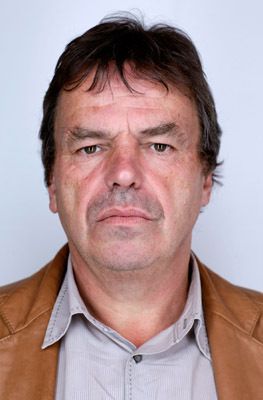
Lets keep this quote from Neil Jordan in mind as we watch the inaugural episode of The Borgias. From a 2013 interview with the Irish Times:
Jordan: “In television, the director isn’t that important. That’s what I learned as the creator of a television series [The Borgias]. For someone like me, its a dream in a way. Its a tough one. The head of a studio once said to me, “You’ve got to make tv director-proof”. In other words, its the writing and the true line of the characters than mean everything[emphasis mine]”.
As my old creative writing teacher used to say: "It's good to know what someone intends to do in their work--that way you can make sure they actually do it as you read it."
Jordan's writing isn't by any means bad--but his willingness to circumvent historical accuracy (and not acknowledge that he'd doing that in any way, shape or form via a preface at the beginning of the show or end credits) solely for the sake of making a by-the-numbers mediocre period soap opera makes my teeth pop.
And there are so many opportunities that he just kind of quietly shat on when they would have been excellent television. This will be a recurring theme in this blog: missed opportunities, historical weirdness, and other inexplicable occurrences, not to mention back-tracing 20th-21st century morality back onto a time where it didn't exist. Four things.
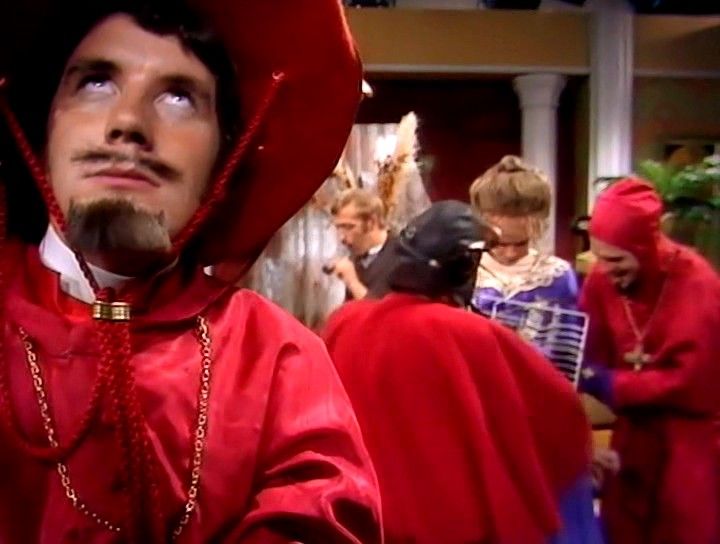
The Borgias opens with Pope Innocent VIII dying. As he does so, the pope takes the time to castigate the assembled cardinals who'll have a role to play (Picollomini, Giuliano della Rovere, Rodrigo Borgia) regarding “Greed and lechery.” The standard party line on the church being so corrupt, and whoever will sweep it clean? This is a twentieth century line when dealing with the Catholic Church. There have been men of conscience who became Pope, but they are the exception rather than the rule--especially during the Renaissance. But history aside, let us talk about why narratively Innocent VIII's "sin and greed" monologue grates on me so.
[Deep breath here]
I think really think that’s an unlikely sentiment from a sitting (lying down) pope of the state of the church AFTER he’s had complete control.
Its a bit like the captain of a cruise ship running aground, and as he dies of a heart-attack, still clutching the wheel of the ship asking the attendant officers: “Who will ever get us out of this predicament, which by the way was in no way my fault?”
That's what the show would have us believe is happening as the opening device.
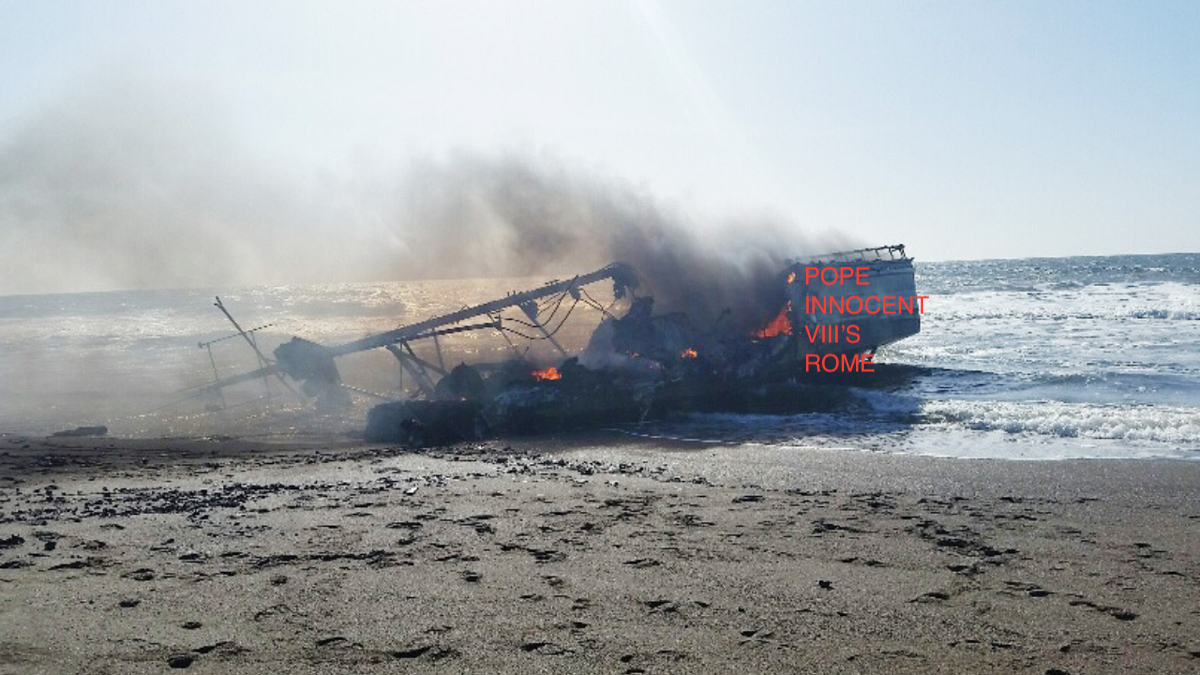
Pump the brakes here bud.
The greed and lechery of the clerical orders were features, not bugs of Renaissance politics and culture. Papal historian (and writer of the definitive biography of Julius II, from which I quote below) Christine Shaw talks about the nipoti system in place during the Italian Renaissance--that was the standard way things were done at the time of the show (1492):
"Historians have tried to rationalize the nepotism of the Renaissance as being in the best interests of the papacy. The placing of papal nipoti--nephews, great-nephews, cousins of various degrees, even sometimes sons--in the College of Cardinals by Sixtus and other Renaissance popes has been excused by those anxious to vindicate the honor of the papacy, or by those convinced that there had to be some explanation other than mere family affection and dynastic ambition, as a necessary step if the popes were going to re-establish the authority of the papacy over the cardinals...Exactly how the appointment to the College of one or two, or even more papal relations, usually inexperienced and under-qualified , and sometimes under-aged, was supposed to help the pope control rebellious cardinals has not been explained."
Tl;dr: Renaissance papal politics was dirty as all hell, riddled with nepotism and other types of corruption, but that didn't mean it was inherently efficient--or viewed as anything out of the ordinary for the time.
Here is what Pope Innocent actually did on his death bed. He used his papal authority to gift an obscene amount of money to his family from the papal coffers. Rodrigo Borgia protests--this is nepotism, and besides if he's lucky enough to become pope next, he'll need that money--but is ultimately overruled by della Rovere. della Rovere's biographer, Christine Shaw summarizes the last moments of Innocent VIII:
"Reports emerged of the spectacular row between the cardinals at the deathbed of Innocent, when Borgia objected to the pope's distribution of all the reserves of cash (47,000 ducats) to his family and asked him to put the Castel Sant Angelo in the custody of the College of Cardinals.
Vincula [della Rovere] defended Innocent's gift to his relatives, for which he had asked the cardinal's consent, and argued that the papal fortress should only be handed over to the new pope. He reminded Innocent that Borgia was a Catalan (a name with an unpleasant sound to Genoese ears) and had his own candidates in mind for the papacy.
Borgia took this intervention as an affront to the dignity of his office, saying that, were they not in the presence of the pope, he would show them who the vice-chancellor was; Vincula retorted that he wasn't afraid of him.
Retorts degenerated into the trading of insults, until Cardinals Sforza and Colonna intervened and calmed them down."
Anyway, following the course of human things, Pope Innocent VIII dies.
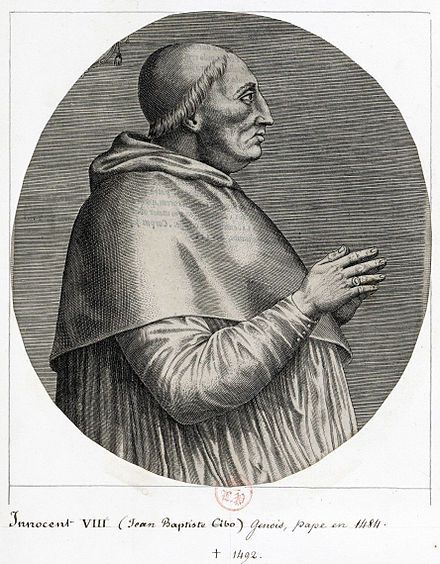
About the only in-character thing that happens during this dying diatribe is that Giuliano della Rovere (who I will get to in more detail in a later blog--as I'm morbidly fascinated by him) and Rodrigo Borgia (the main-ish character) practically fall all over themselves vying for the coveted ‘biggest suck-up’ award to the now dying--and now dead Pope Innocent VIII.
This is in stark contrast to what Borgia and della Rovere ACTUALLY did in the historical record, which is nearly get into a fist fight over Pope Innocent's corpse over distribution of papal funds.
So right off the bat, Jordan has passed up some primo history and establishing character moments in his first scene of his series.
Imagine if Jordan had done something like this for the opening scene of the show:
Pope Innocent VIII lies dying in bed. His last wish is a jaw dropping amount of money to be given to his family from the papal till. Cardinal Borgia objects--oho, the audience thinks, is this the same Borgia who will later become a byword for corruption? Interesting, the show is painting him as a reformer.
Borgia argues the money should not profit a single family, but instead the papacy and thus should remain in the papal coffers.
He's interrupted by Cardinal Giuliano della Rovere, who argues that the pope can do as he wishes, what are you deaf or something? Ok, the viewer thinks, setting up the bad guy, clearly arguing for corrupt practices, obviously a lickspittle who...wait. Is he holding the dying pope's hand? Could he be supporting this practice for sentimental reasons?
Borgia and della Rovere escalate their arguments, in increasingly loud voices and increasingly ignoring each other's personal space. della Rovere calls Borgia a dirty Spaniard or something to that effect and the argument looks to turn physical. Tempers run higher and higher.
The other cardinals break it up, and Pope Innocent's last wish is granted. Both Borgia and della Rovere fume at each other with bad grace from across the room. Pope Innocent dies--and the cardinals leave, except Giuliano della Rovere, who takes the time to close his old friend's eyes one last time.
Rodrigo Borgia watches him from the doorway. They exchange a look.
Boom! Scene over. Characters established, along with mood, a little bit of exposition and intrigue. Maybe even some subtlety. But that's clearly too much to expect.
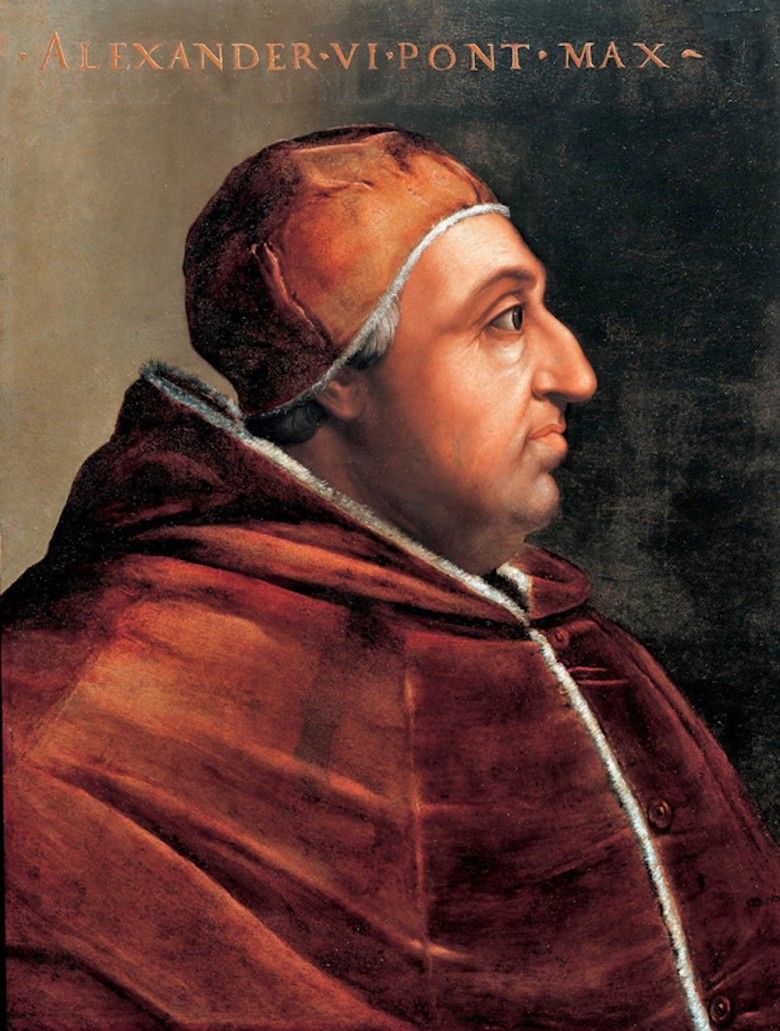
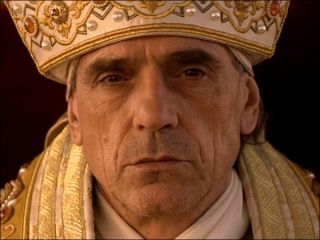
Next scene
Lucrezia Borgia peeks in on her brother Cesare boning some random woman with more than strictly professional interest. However, she’s not the stealthiest person in the world, and is discovered, scaring away the woman mid-thrust. Cesare chases her down, wrestles her and with weird sexual tension while talks about how great it would be if their father, Rodrigo were pope. But, c'mon guys, what are the odds of that happening?
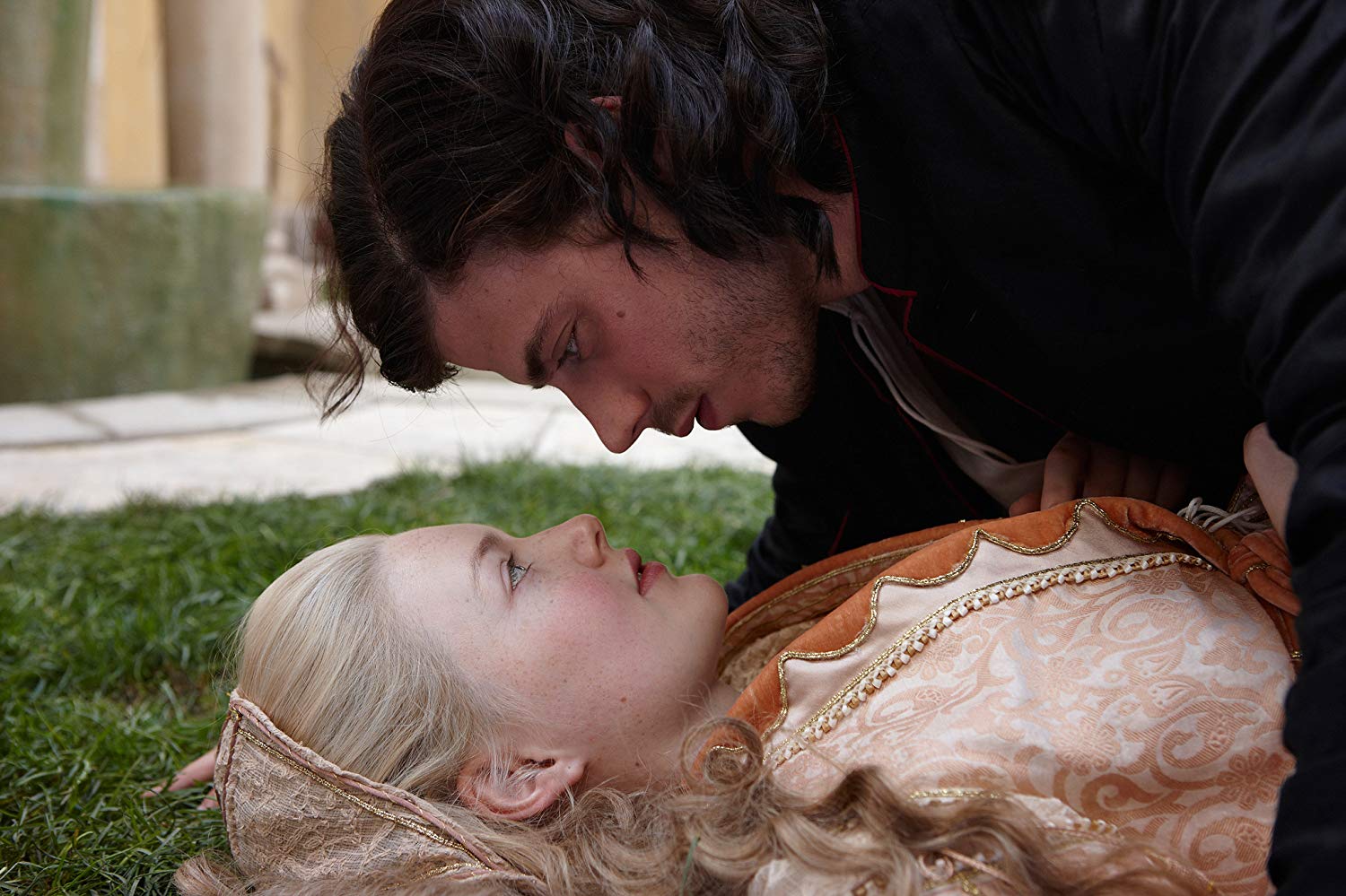
Next scene
A literal ring kissing scene is attached to the funeral of Pope Innocent VIII. The papal conclave to elect a new pope is convened. Cesare gives a tongue-in-cheek definition of simony for the benefit of the audience. Durrr. Rodrigo and Cesare scheme to create a carrier pigeon lifeline so that Rodrigo can communicate even during the isolation of the conclave.
Next scene
Juan “I’m a swaggering mistake” Borgia picks fight in the streets, gets wrecked. Cesare intervenes on his brother's behalf (non-fatally, which is bullshit), Juan is ungrateful and the world continues to turn. If you ever want to feel better about your place in history or personal growth, know that at least you weren’t Juan Borgia.
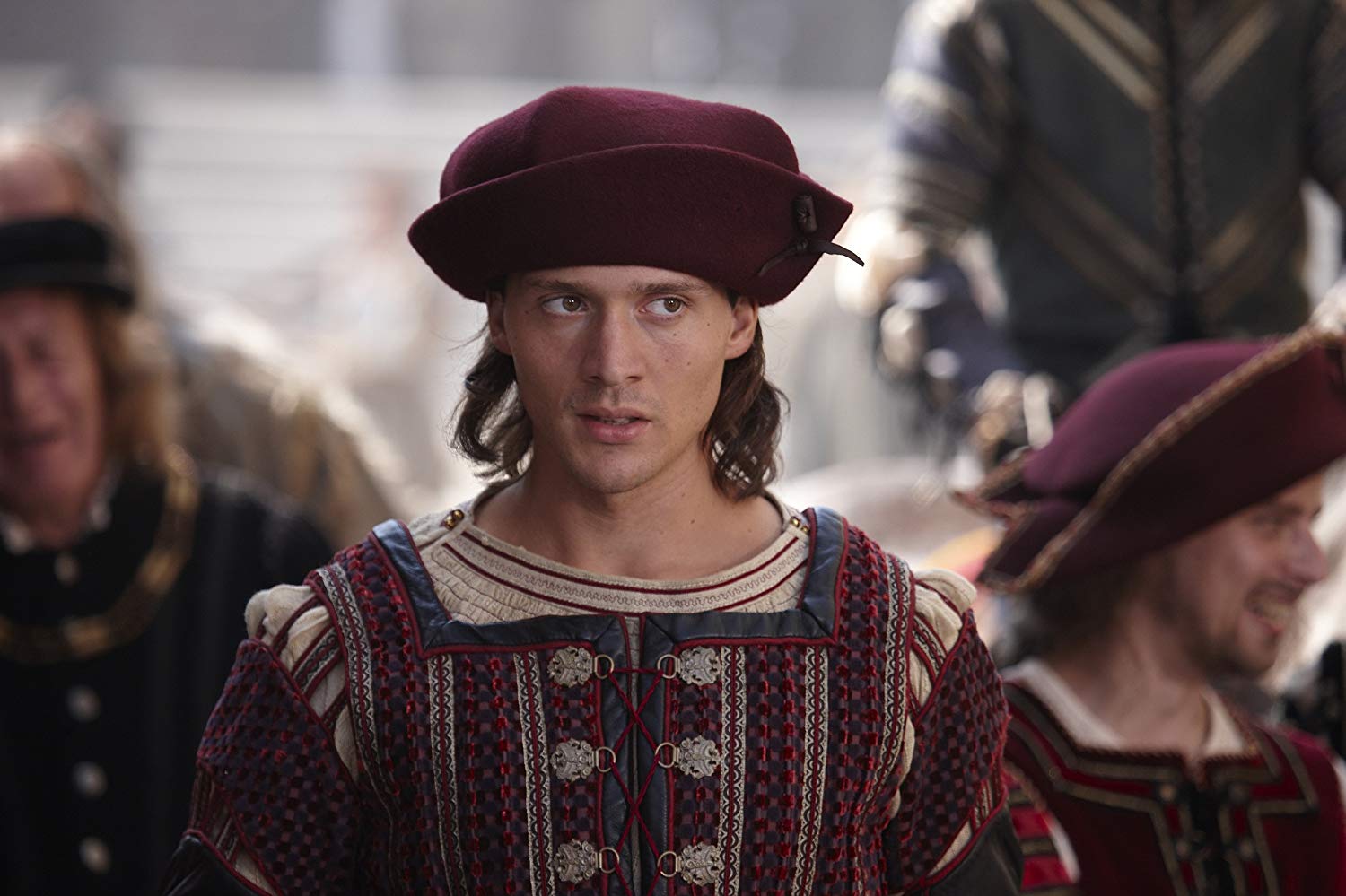
Next Scene
Giuliano della Rovere, the show's main hero-antagonist, lectures Rodrigo Borgia in a spare moment that he needs goodness to be a good pope (which is bullshit, considering the times). However, amidst the turds and 21st century morality awkwardly stapled to the corpse of this script, there is a bit of a gem.
Giuliano della Rovere does make an off-handed remark about Rodrigo’s “organizational genius”, which is the first shred of historically accurate anything in this show. This and his nearly supernatural talent for scheming (back-room dealing, betrayal etc.) is the first gleam that we're dealing with the magnificent bastard Machiavelli wrote of rather than a construction from whole cloth and a bunch of half-moldy political tropes.
Next Scene:
Borgia loses the first round of papal voting. Not surprising, the conclave is a trial of endurance as much as it is a political event. Rodrigo gets a fine quip (in response to his sumptuous imported food, such as roast duck and suckling pig) when criticized for said tastes:
Papal food-checker: St. Augustine took a vow of poverty and fasting.
Rodrigo Borgia: St. Augustine never had to vote in conclave.
But wait, there’s a method to Borgia’s exorbitance. He’s hiding bribes inside the lavish dishes and promises of land and title to those he thinks he can sway to his side! Pretty sneaky. But not unprecedented.
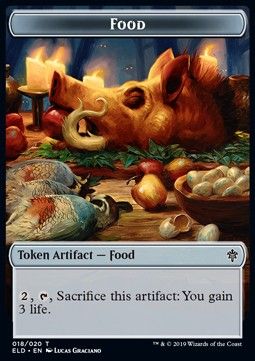
Next Scene
Before we even talk about the next scene, I’m just gonna come out and say that its weird to have Cesare Borgia as an audience surrogate. The show, from what I've read, is trying to make him wide-eyed and impressionable at the start, and make the first season his start of darkness. I'm not against this--it's just kind of hard to imagine Cesare Borgia as innocent, ever.
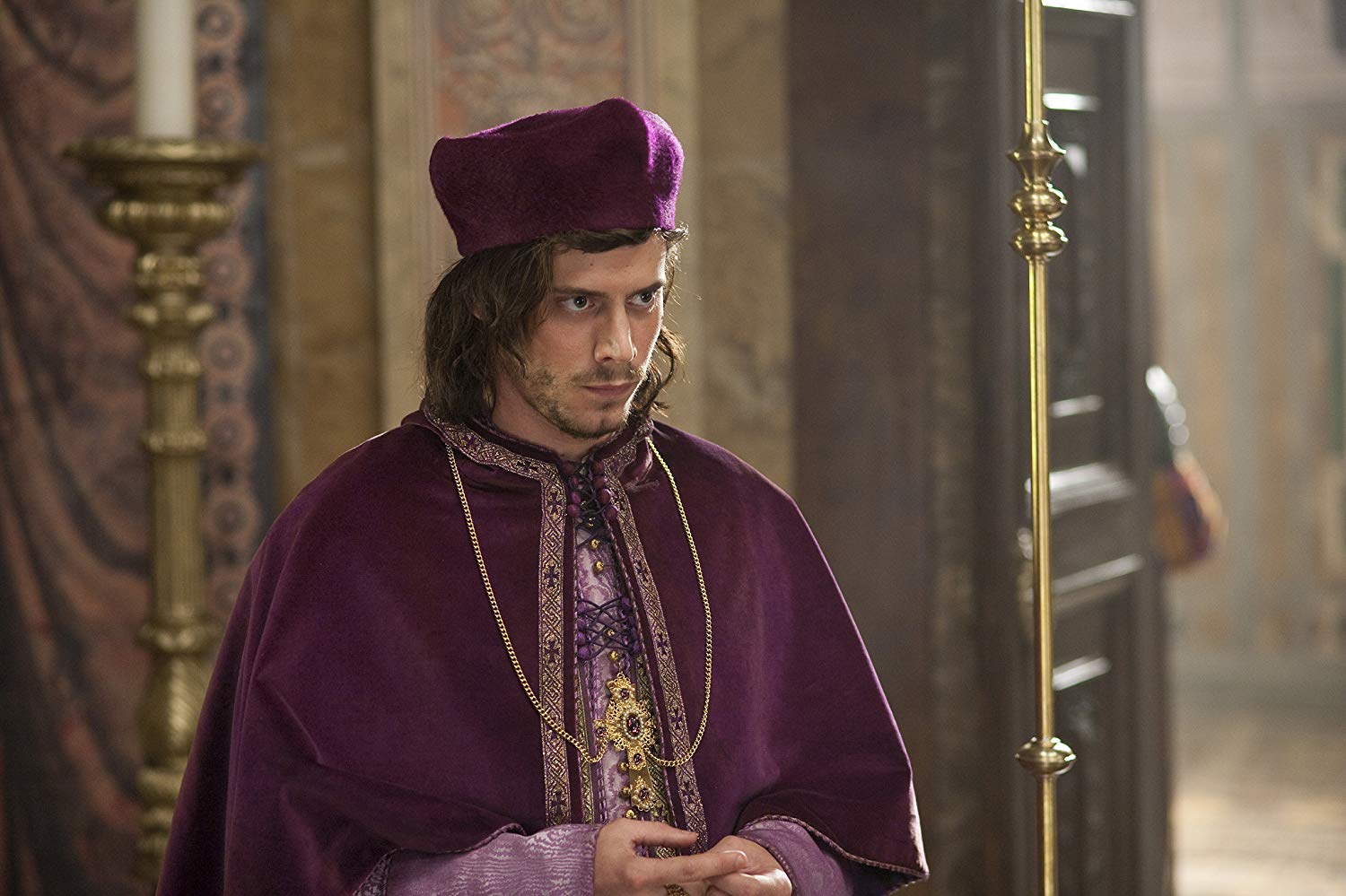
Anyway, we have Rodrigo Borgia talking with Ascanio Sforza (representing the major power-broker family of northern Italy, the Milanese Sforza family, who I can't wait to get into later--the Papal Conclave of 1492 is getting its own blog, because ye gods).
Its a back and forth, haggling over price, which Ascanio demands Rodrigo’s current position in return for throwing his vote (and those of the others he has in his back pocket) behind the Spanish claimant for pope. Rodrigo agrees, and Ascanio slithers away.
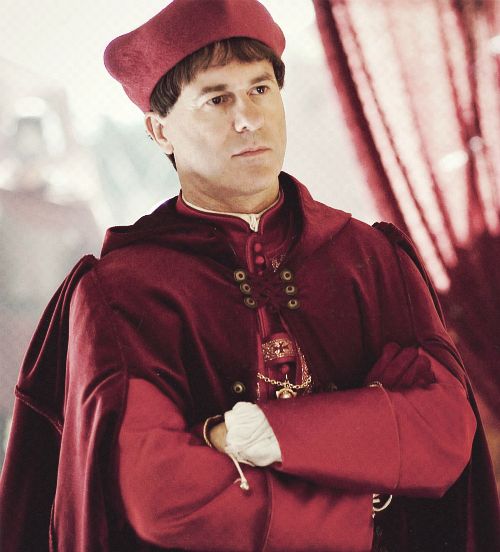
Next scene
Rodrigo ascends to the Papacy. Giuliano della Rovere objects on grounds of simony (…hilarious, a more accurate characterization would be 'better use of simony than me, Giuliano della Rovere'), some Spanish bashing (as the Borgias were Spaniards, and thus, the Italian papal families hated them). One quick testicle grab later via dangling ceremony later to confirm Rodrigo is not a woman (the ceremony was a response to the mythical woman pope, Joan, and the testicle grabbing ceremony, while funny, is likely ahistorical as well) and Rodrigo Borgia becomes Pope Alexander VI.
Rodrigo Borgia is confirmed to be pope.
Here’s where the show lost me the first time, completely.
The face that Jeremy Irons makes when he’s named pope is rather difficult to put into words. Nevertheless, apparently I tried, because my notes simply say ‘Jeremy Irons has a weird, sad-cum-face on when he puts on the miter.’
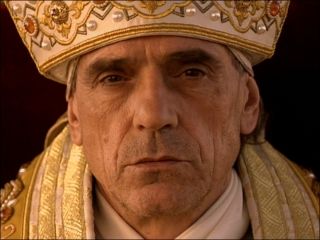
TV-Rodrigo is awkward and odd and seemingly humbled by the scale of his responsibility as pope. He begs his son Cesare in private to help him ‘“decipher the silence of God.” In short, the show is trying to show Tv-Rodrigo as ahead of his time, a secular man trapped in a religious world, a man of surpassing charm and values that track far closer to ours, the audience.We are meant to empathize and relate to these characters, and see that they are just like us.
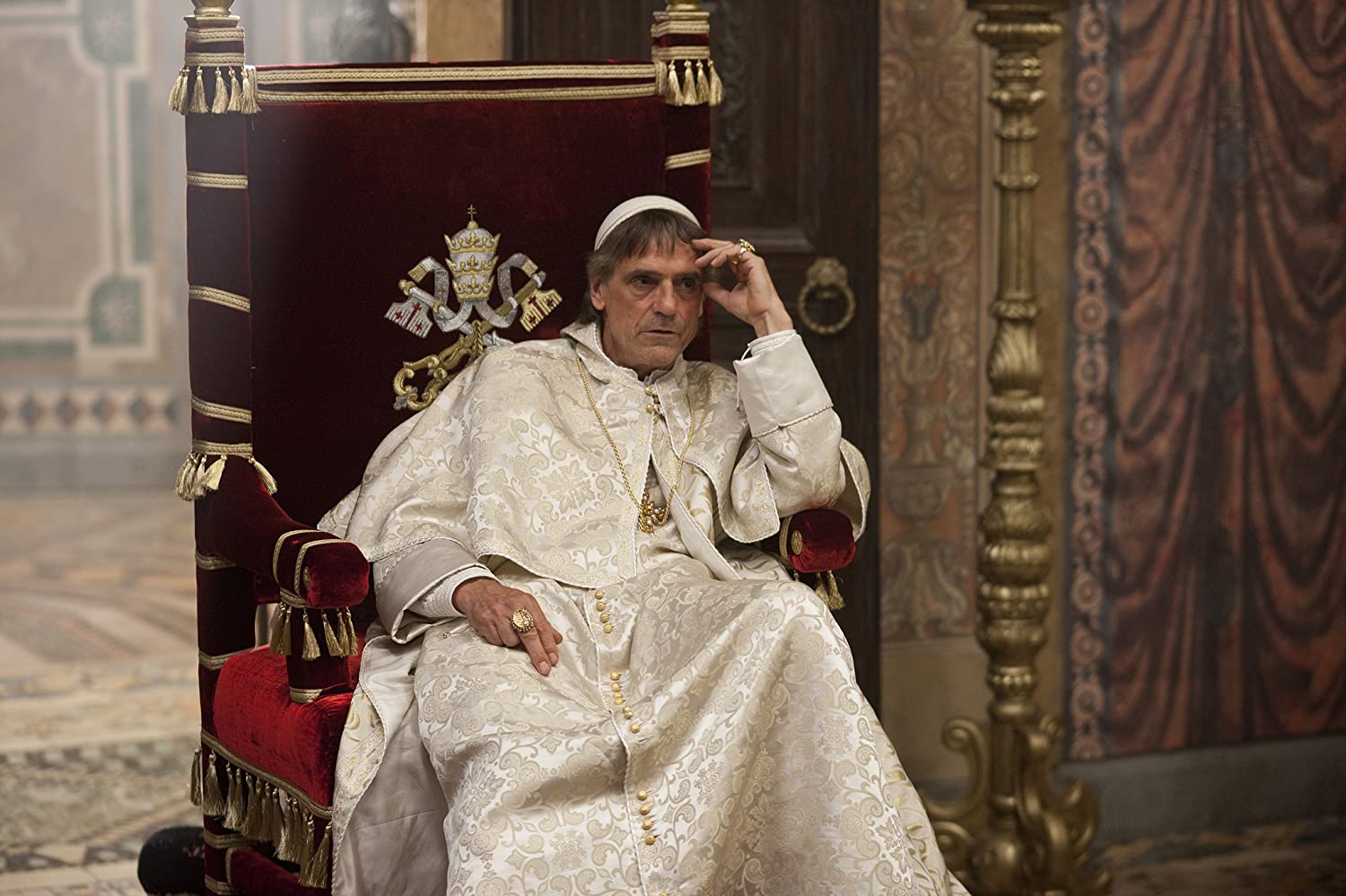
Here’s the problem. This is pretty much the EXACT opposite of what happened when Rodrigo Borgia ascended and became Pope Alexander VI. I’ll let Hibbert’s The Borgias and Their Enemies present my point here:
“The new pope then appeared at the window, wearing the largest of the three sizes of papal robes that had been made in advance and laid out for the successful candidate. He was clearly much excited by his victory; instead of modestly declaring “Volo,” as custom required, he [Rodrigo Borgia/Alexander VI] shouted repeatedly: “I am Pope! I am Pope!”
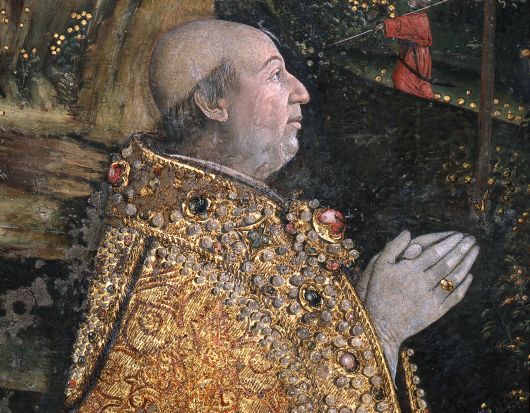
For the day, that’s pretty much a huge breach of decorum (but he can do that, he’s pope), followed by doing an insulting dance in the end zone and then spiking the football so hard it takes someone’s eye out, if you’ll permit an anachronism. He acted far more like Pope Cartman the First than anyone might expect, but nobody said the Borgias were subtle or discreet about their victories.
Next Scene
Rodrigo is awkward at a crowd. Juan is a dick. Cesare’s presence in a confessional is insane. Cesare says to Rodrigo that they have enemies everywhere, which may be the one accurate thing he’s said this episode. Rodrigo counters with the well thought out response of, basically: “I’m Pope, screw them.” Again, he’s not wrong, exactly, but hardly helpful, either.
Cesare, however, really doesn’t want to be a cardinal. He doesn't say so, but he's afraid it'll hurt his murder-record, since he's itching to be a soldier, something his older jerk of a brother Juan already is. This is a growing source of tension between the brothers, and thankfully its established in the first episode. Kudos.
Anyway, newly enpopened-Rodrigo isn’t taking any of his son’s guff however, and functionally says: “Shut the up and do your job as cardinal [or we’re all dead].”
Next Scene
Rodrigo and Lucrezia talk. And Rodrigo tells their mother, Vanozza, that they must be apart now that he’s the pope. He may not have sex with someone else for literally HOURS at a time.
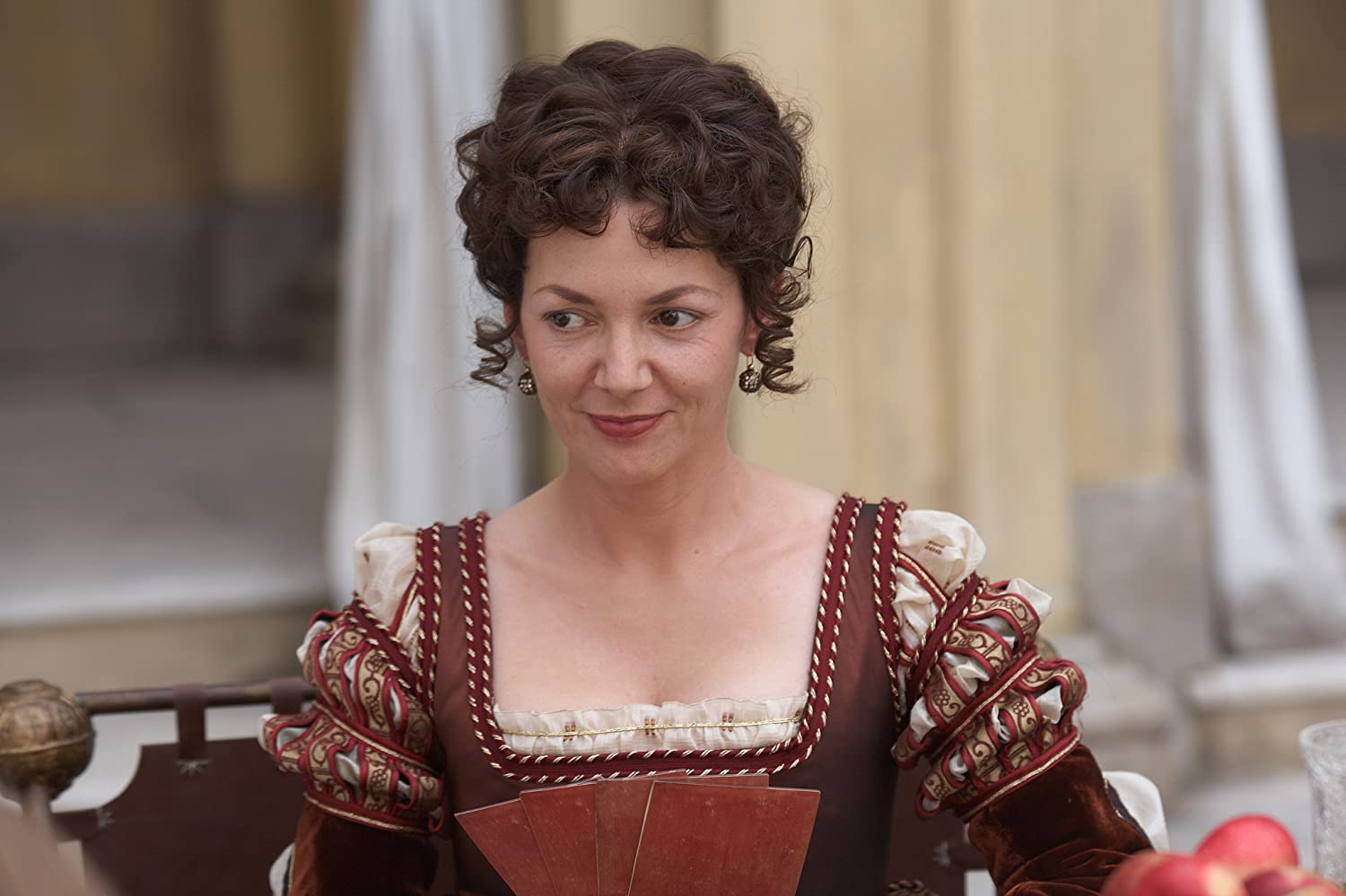
I’m sure this newfound celibacy of Rodrigo's will last.
Pope parallel crowning moment of awesome for Rodrigo. Jeremy Irons dons yet another a sad-cum-face along with his papal robes. More Cesare and Lucrezia flirting.
Rodrigo gives a brief, insistent clarification that “I am we” now that he is Pope. I can believe a lot of things about Rodrigo Borgia, but that he’s “overwhelmed by destiny” isn’t one of them. This is a man who, like his rival della Rovere, has been eyeing the big chair for decades. He probably lay awake, night after sleepless night, imagining just who he'd excommunicate when they sassed him.
So of course, Rodrigo Borgia goes to pieces in front of his son Cesare in the Papal chambers. He begs his son to “help him interpret the silence of God,”. This is wildly out of character—for any pope.
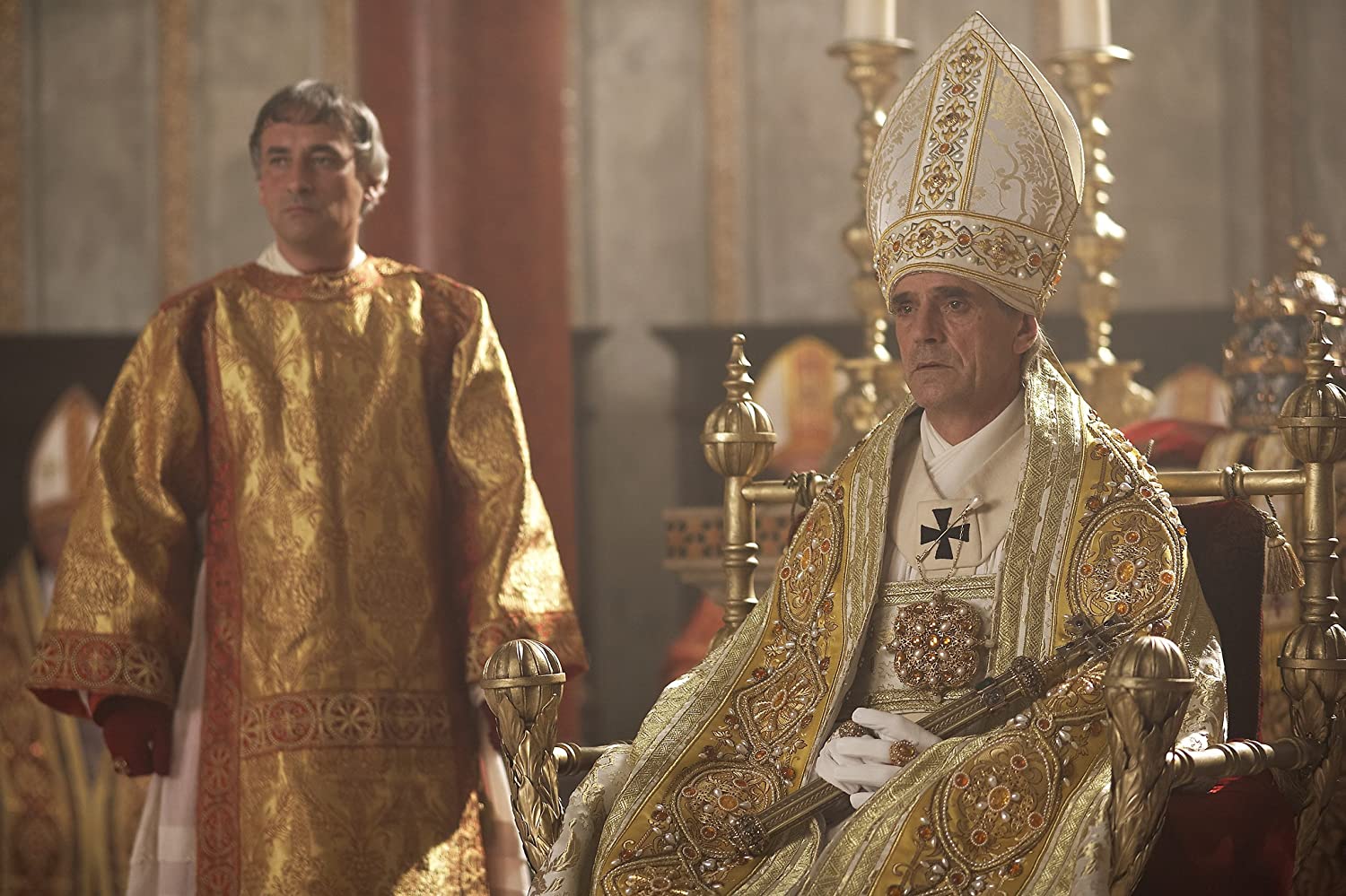
Anyway, in the next scene, della Rovere schemes with France. More on that in a bit.
Rodrigo meets with Ascanio "Frankie the Snake" Sforza. Again. The Milanese are restless. But that's their state of being, as it is.
Next Scene
Papal meeting. Everyone get into the holy chambers. There’s POLITICS to do! Turns out, not everyone is super-duper jazzed about Rodrigo Borgia becoming Pope Alexander VI. Chief among them is...
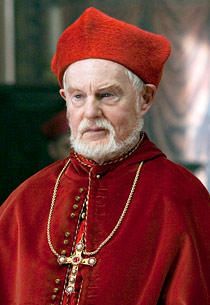
Derek Jacobi joins the cast of tragically wasted talented actors as Cardinal Giambattista Orsini (head of the Orsini clan) one of Rome’s heavy hitting families. The Colonna—walking dick-jokes that they and their coat of arms were—and mortal enemies of the Orsinis are nowhere in evidence. One of the reasons for the absence of the Colonna might have been that the Orsini all but wiped them in what was functionally a multi-generational gang-war that nearly destroyed Rome multiple times (the Colonna got better). You know, little stuff.
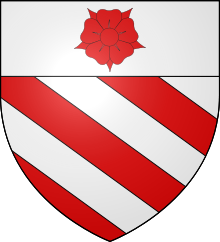
Anyway, Giambattista Orsini (Jacobi) loses his shit at Rodrigo Borgia’s (completely standard, for the time, under the nipoti system) attempt to elevate more cardinals into the Holy See—as long as they are friendly to Borgia interests or related to the Borgias. The scale of his rapid promotions was new, sure--but not the principle underlying them, as this show loudly states.
Jacobi gives full reign to his inner hamminess and shrieks “SIMONY!” at the top of his lungs, like a parrot that thought it was going to get a nice bit of banana but bit into a penis instead.
Because nobody would EVER do something like this in all papal history. Except, of course, you know, every other Pope ever to wear the miter in the 14th and 15th centuries and even well before then.
Orsini is so unsubtle in his opposition to the pope, that Giuliano della Rovere has to literally kick him under the table to shut him up. It’s hard to scheme when your associates can’t go two whole seconds without loudly announcing their plans.
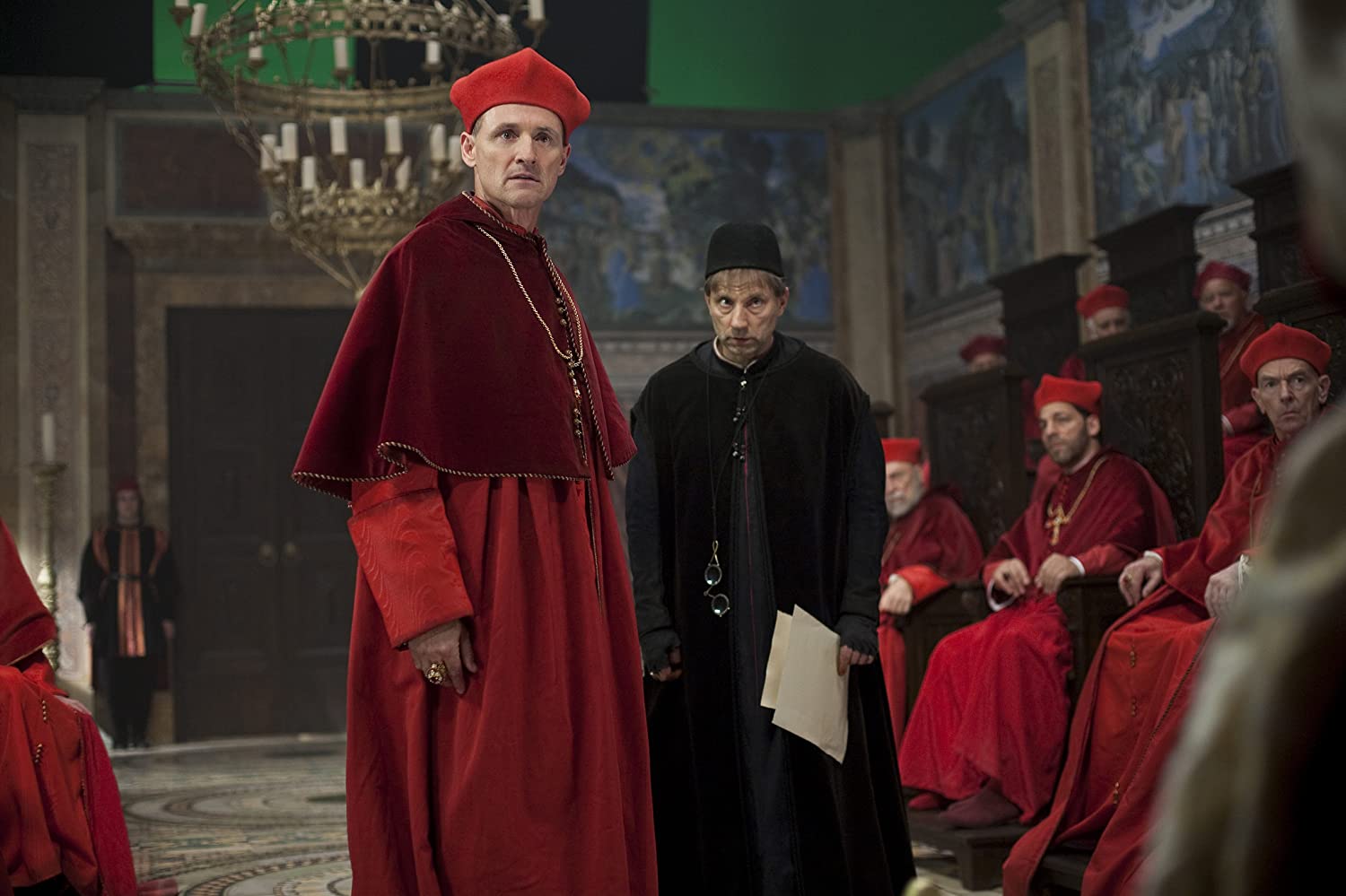
Giuliano della Rovere tries to show Orsini how it’s done: watch, as he sucks up to Rodrigo, but unconvincingly. He kicks Orsini again, and the simpering solo becomes a duet.
Orsini invites everyone to a big, in no-way suspicious party at his palazzo. There definitely won’t be anything hinky, suspicious, or untoward there! No way, no how! Definitely no assassination attempts whatsoever.
(and definitely no poisoning, not no way, not no how.)
Next Scene--Winner of the "Most Wasted Potential" of this Episode!
Rodrigo and Cesare arrive at Giambattista's mansion in a carriage. Apparently Cesare has a capuchin monkey now, to test for poison because—of course he does?
This is the subject of much discussion at the in-no-way-suspicious banquet, especially when the monkey shits on the table.
I might have left this go a bit too long, but this whole situation is bullshit. Or monkey-shit. Even the scene before it is included in the feces-sphere. Not only is this whole last part of the episode historically less-than, shall we say, accurate--but it also passes up a truly wonderful opportunity for sustained tension.
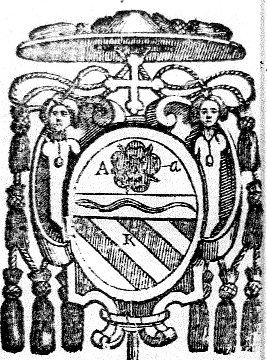
You see, Giambattista Orsini was not an enemy, at least of first, of the Borgia's papal agendas. He was the deciding vote that tipped the scales in the Borgia's favor. Rodrigo owes the Orsini in a MAJOR way--and rewards them handsomely for their support.

However things did not go as well as Giambattista might have hoped, long term.

"Big deal," you might say, "so he's the exact opposite of his historical counterpart."
To which I say, "Oh, but it is a big deal. You see, Giambattista Orsini stayed in close with the Borgias--until the French invaded Italy during the Franco-Italian wars a few years later. Then the Orsini turn on the Borgia when they are needed most."
Unfortunately, the Borgias survive the Franco-Italian wars. Giambattista Orsini is thrown into the Roman fortress of Castell Sant Angelo and dies there after twelve days--likely poisoned by the Borgias for his unsuccessful treachery.
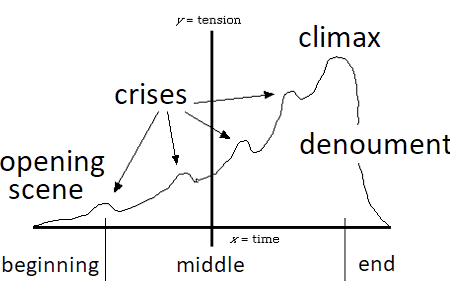
This is a classic story. The critical ally's defection at the darkest hour, and his subsequent comeuppance. The Borgias have been compared to a crime family. Appropriate. Mario Puzo, of Godfather fame, even once turned his hand to historical fiction to tackle the Borgias--with some results.
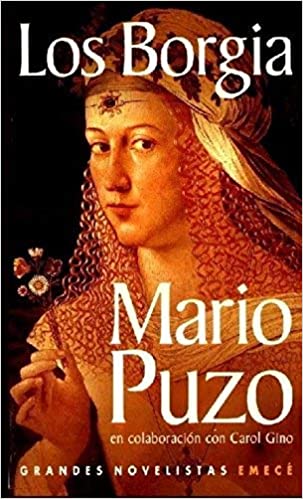
The reason I mention Puzo is that the Borgias are often portrayed (with some justification) as a sort of proto-Mafia. Every good mafia story needs what we talked about above--an unthinkable betrayal followed by a brutal retaliation.
This historical plotline--piloted by Sir Derek Jacobi--is what Neil Jordan passed up. A historically accurate, made-for-screen epic tale--while the audience is focused on the obvious anti-villain of Giuliano della Rovere and his quest to bring down the Borgias, those who don't read history won't suspect the Orsini's eventual betrayal. Those who do read history could have savored the sword of Damocles over the Borgias.
All in all, a big missed opportunity for storytelling and historical accuracy.
Anyway, back to the sub-par action. Whee.
Cesare’s poison sense tingles, so he investigates the Orsini kitchen’s mid-feast. There, he happens on a man, Micheletto Corella, poisoning a bottle of wine meant for the Borgias—as proved by the dead monkey by the bottle. Convincing, convenient proof if there ever was any.
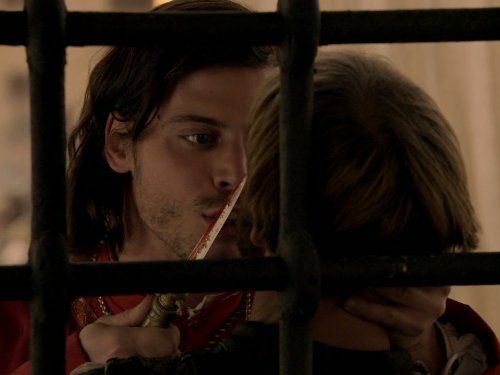
There is a truly ridiculous knife fight where Micheletto has Cesare dead to rights, but since if we kill him off now we don’t have a show, the assassin accepts the Borgia counter-offer to poison Orsini instead.
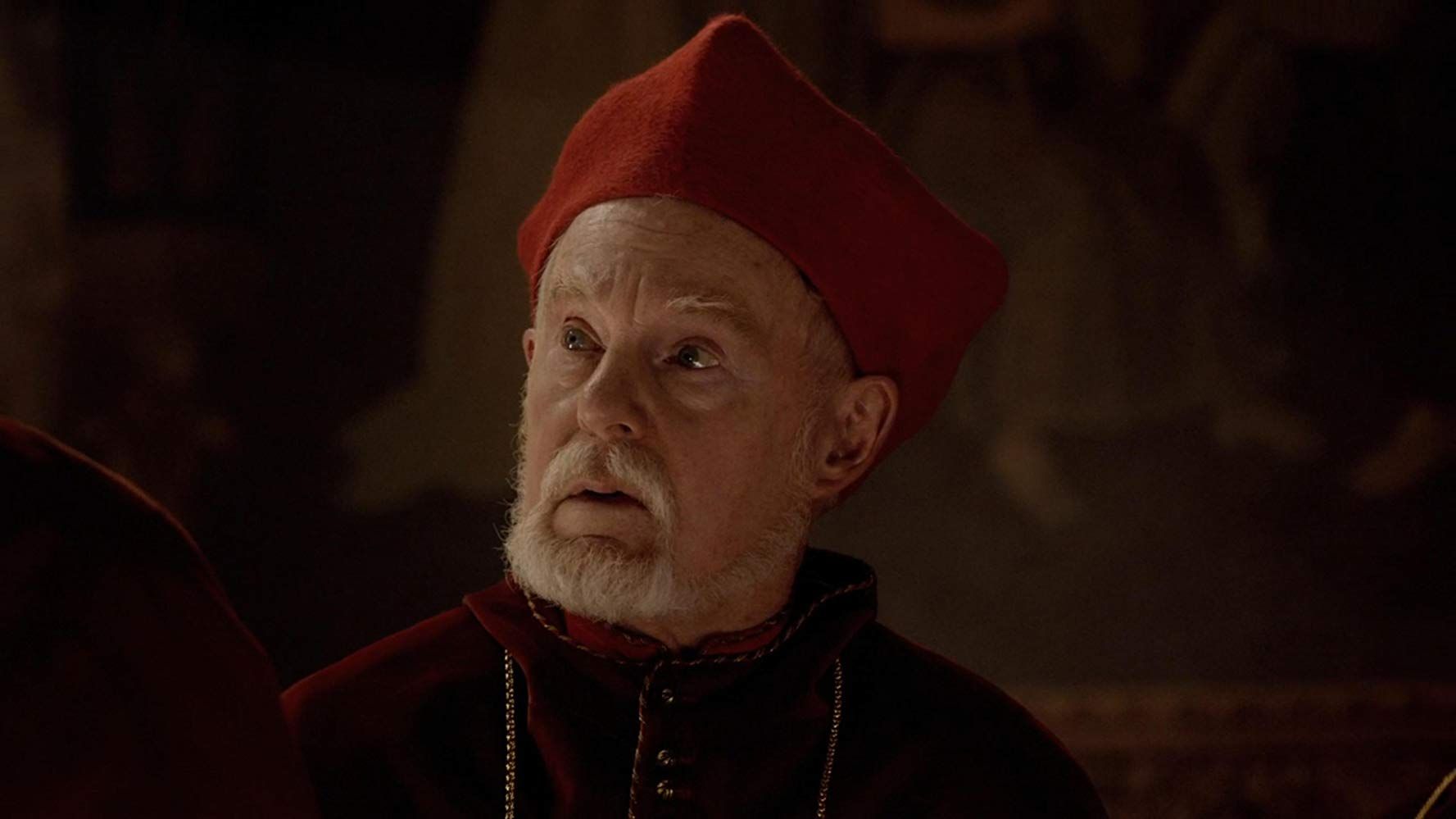
(This is not even remotely historically accurate, on so many levels detailed above).
Here ends the episode, with a dead cardinal, a dead ape, and most of my hopes for this show not far behind. But there's a whole two seasons to get through, so lets not dilly or dally!